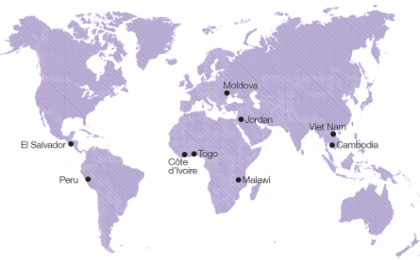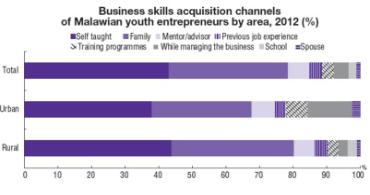Sociétés inclusives et développement
Youth well-being policy review of Malawi: A 60 seconds guide
|
About |
Policy focus |
Participating countries |
Publications |
News and Events |
 |
What is the Youth Well-being Policy Review of Malawi?
|
The Youth Well-being Policy Review of Malawi provides an in-depth analysis of the situation of Malawian youth through a multidimensional approach and provides recommendations to address major policy gaps in youth well-being. The review includes:
The review is part of the Youth Inclusion project, co-funded by the European Union and implemented by the OECD Development Centre. |
|
How's life for young Malawians?
|
With more than 46% of the population below the age 15, and youth (aged 15-29) accounting for one-quarter of the population, Malawi is a youthful country and will remain one in the next decades. Yet, Malawian youth face multiple and interconnected challenges. Despite the recent increase in school enrolment, early school dropout is still widespread in Malawi. Only 35% of students in primary education complete the cycle. As a result, enrolment insecondary education decreases to no more than 18%, and enrolment in vocational and tertiary education remains extremely low (2.2% and 1% respectively). Moreover, the quality of education is poor, resulting in a large share of students without functional literacy and numeracy skills. The overall health situation of young Malawians has improved substantially, thanks to the decrease in HIV/AIDS prevalence among young women. However HIV/AIDS remains the leading cause of death among young people. Access to sexual and reproductive health (SRH) remains insuffi cient, especially for young women, which increases health risks and results in frequent early pregnancies. Youth civic engagement and political participation has reached relatively high levels, particularly among young men and young people living in urban areas. Remarkably, despite this high interest and participation, only around half of young Malawians trust in institutions and hardly one third trust the honesty of elections. Access to decent work remains a big challenge for the young workforce in Malawi. Although the majority of young people are working, most of the time they are in low-quality employment:around 83.5% of them work in the informal sector, more than a quarter are underemployed, and 82% are underqualified for their current jobs. Recognising the importance of education and skills for development, the government adopted several policies and strategies on TEVET but much remains to be done in terms of regulation and co-ordination. Even though TEVET capacity has increased substantially in recent years, it remains small compared to needs and a number of barriers hinder enrolment by disadvantaged youth, such as high academic entry requirements, fi nancial constraints, and socio-demographic and cultural issues. Employers highlight the lack of profi ciency in technical and organisational skills. Moreover, qualification mismatch and skills gaps remain in strategic sectors, such as mining, agro-processing, construction and tourism. |
|
Did you know...?
Rural youth entrepreneurs in Malawi have low education levels and acquire business skills informally (80.3%), either by being selftaught (43.9%) or through family members (36.5%). |
|
|
How to address those challenges?
|
Youth Development and Empowerment is a key priority for the Malawi Government. Its National Youth Policy (NYP, established 2013) aims to empower Malawian youth and encourage their participation in policy development. The Ministry of Labour, Youth, Sports and Manpower Development (MoLYSMD) is in charge of the development, co-ordination and implementation of all youth interventions. The work of the MoLYSMD is supported by the National Youth Council of Malawi (NYCOM). Various other ministries and institutions also focus on youth and implement a wide range of Despite efforts to involve all relevant stakeholders, the government struggles to consolidate and integrate the various opinions and views of multi-sectoral actors working on youth. The MoLYSMD faces important obstacles to leading the co-ordination and implementation of youth policies effectively, notably in terms of human resources, as structural and financial constraints remain big challenges. |
What can the government do?
|
Strengthen the institutional framework and governance of youth policies
Improve the quality and relevance of technical and vocational education to facilitate youth’s transition into the labour market
Unlock the potential of rural youth entrepreneurship
|
Documents connexes

